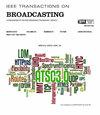当多路径QUIC满足模型预测控制和频带稀疏网络编码:一种新的异构无线网络视频流多路径解决方案
IF 4.8
1区 计算机科学
Q2 ENGINEERING, ELECTRICAL & ELECTRONIC
引用次数: 0
摘要
与网络编码相结合的多路径快速UDP互联网连接(MPQUIC)为异构无线网络上视频服务的体验质量(QoE)提高提供了一种很有前途的方法。然而,当编码节点在等待端点的解码确认(ack)时传输可能冗余的数据包时,会出现一个重大挑战。这种行为会限制有效的传输速率,从而降低实时流性能和用户QoE。在本文中,我们提出MP2-QUIC,它通过MPQUIC的一种新的自适应模型预测控制(MPC)框架来解决这些挑战,该框架通过离散状态转换模型优化拥塞窗口和编码冗余参数。MP2-QUIC通过引入工作点线性化并利用中心极限定理,有效地提高了模型在异构无线网络环境下的控制性能和有效吞吐量。MP2-QUIC进一步采用带稀疏网络编码(Band-SNC)来最小化端点的计算复杂度,同时利用排队论原理来确定最佳编码包数量。这种集成方法显著提高了终端用户的QoE,实验结果表明MP2-QUIC与现有的MPQUIC编码方案相比性能优越,峰值解码开销降低了68.85%,峰值信噪比(PSNR)显著提高。本文章由计算机程序翻译,如有差异,请以英文原文为准。
When Multipath QUIC Meets Model Predictive Control and Band Sparse Network Coding: A Novel Multipathing Solution for Video Streaming Over Heterogeneous Wireless Networks
Multipath Quick UDP Internet Connections (MPQUIC) integrated with network coding offers a promising approach to improving the Quality of Experience (QoE) for video services over heterogeneous wireless networks. However, a significant challenge arises when encoding nodes transmit potentially redundant packets while awaiting decoding acknowledgments (ACKs) from endpoints. This behavior can limit effective transmission rates, thereby degrading real-time streaming performance and user QoE. In this paper, we propose MP2-QUIC, which addresses these challenges through a novel adaptive Model Predictive Control (MPC) framework for MPQUIC that optimizes both congestion window and encoding redundancy parameters via a discrete state transition model. By incorporating operating point linearization and leveraging the Central Limit Theorem, MP2-QUIC effectively enhances the control performance and effective throughput of the model in heterogeneous wireless network environments. MP2-QUIC further employs Band-Sparse Network Coding (Band-SNC) to minimize computational complexity at endpoints, while utilizing queuing theory principles to determine optimal encoded packet quantities. This integrated approach significantly enhances end-user QoE, and the experimental results demonstrate MP2-QUIC’s superior performance compared to existing MPQUIC encoding solutions, yielding a 68.85% reduction in peak decoding overhead and marked improvements in Peak Signal-to-Noise Ratio (PSNR).
求助全文
通过发布文献求助,成功后即可免费获取论文全文。
去求助
来源期刊

IEEE Transactions on Broadcasting
工程技术-电信学
CiteScore
9.40
自引率
31.10%
发文量
79
审稿时长
6-12 weeks
期刊介绍:
The Society’s Field of Interest is “Devices, equipment, techniques and systems related to broadcast technology, including the production, distribution, transmission, and propagation aspects.” In addition to this formal FOI statement, which is used to provide guidance to the Publications Committee in the selection of content, the AdCom has further resolved that “broadcast systems includes all aspects of transmission, propagation, and reception.”
 求助内容:
求助内容: 应助结果提醒方式:
应助结果提醒方式:


